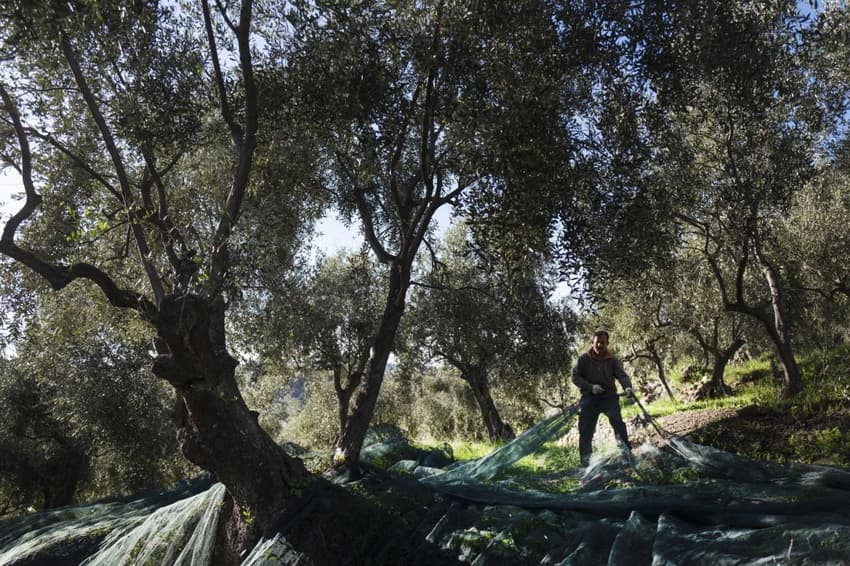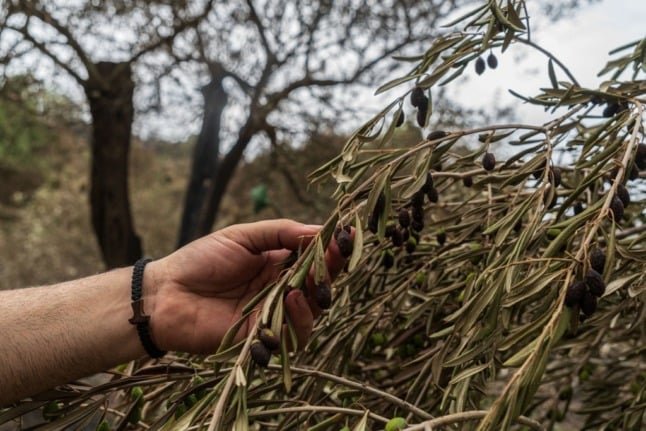'I wouldn’t have it any other way': The ups and downs of growing your own food in Italy

Buying a plot of land in Italy and producing your own fresh vegetables, wine or olive oil is a dream for many, but is it still worth pursuing amid the effects of climate change? The Local's readers tell us about their experiences.
The worsening effects of climate change in Italy are increasingly evident, as the number of 'extreme weather events' - deadly floods, storms, extreme heatwaves and droughts - has risen in the country, and last year saw the hottest summer on record worldwide.
No-one is quite as aware of the adverse impact of climate change as those who work in farms and fields.
Take olive oil producer Chris Taylor, for example. Chris moved from Sheffield in northern England to the outskirts of a small Tuscan town named Vicopisano back in 2019.
He had his eyes set on an olive grove with 800 trees on the back of a converted 17th-century convent, which he has turned into a bed and breakfast.
“I fell in love with the place immediately,” he says. “I knew there was quite a bit of work to do on it, but it didn’t put me off buying the land and building.”
The work he refers to was not mere painting and decorating, but extensive damage caused by a forest fire six years ago.
“A lot of the trees burnt down and the remains of them are covered in brambles,” he continues.
“The previous owners weren’t here full time so they weren’t well maintained after the fire and after five years of being here, I still haven’t gotten down to the bottom of it. I just hope this year the damaged trees will sprout.”
READ ALSO: 'Having an olive grove takes guts, but its worth it'
Forest fires aren’t a rarity where Chris lives. Since the 2018 blaze, two more in the area have happened. The zone, which is inclusive of the Monte Serra hills and towns such as Calci, is high risk. Chris says he lost count of how many trees the fire claimed.
“It worries me so much because I’m so close to clearing everything now and the summers get really dry here. I spend time strimming the grass because it helps reduce the fire risk. It’s just so dry here sometimes.”

A grower shows an olive grove destroyed by wildfires in Tuscany. Photo by Valentina SINIS / AFP.
As well as the risk of forest fires, Chris is worried about the increasing temperatures year-round and the effects of olive production on the trees that were not burnt.
“There was nothing last year and practically nothing the year before that,” he adds. “I had a bumper crop three years ago and sold all 300 litres of the oil I produced. I thought it was the norm, but it isn’t. It’s definitely changing, so I’m worried.
His worries, however, are a small part of what he makes of his overall lifestyle.
“I have a lovely, simple and frugal life and I wouldn’t have it any other way. It’s hard work, but when you get lots of oil, like I did three years ago it makes it all worthwhile.”
READ ALSO: Nine things to expect if you move to rural Italy
Marche resident Mary Ali Hassan Rizzo, along with her husband, has a farm. They grow sunflowers, wheat, and fava, and have 200 olive trees. The couple say they are passionate about land conservation and help out with projects in their local community.
“The huge and obvious bonus is you have your own food and growing your own is a great thing because you know the quality,” she says.
“However, an opposite but equally obvious downside is the weather. Italy doesn't really do any territorial conservation and the climate is also worsening. You can invest time, money and resources in your food or crops or trees, but then because of the changes, you can have no crops or crops that have problems.
“Both pros and cons are equal to each other.”
Dan Kidson, from the United States, is hopeful about the future of growing produce following a bad harvest last year.. He first arrived in his rural village in Grottole five years ago and fell head over heels with the traditional lifestyle, which for many villagers includes growing their own produce.
“I was very struck by the very traditional lifestyle they still lived and I’ve learnt so much from them, including growing my own vegetables and making wine,” Dan says.
Usually, the busiest time of the year for the residents in Dan’s village is during the harvest season. He says it’s a time when the villagers gather together and share the produce they can with other villagers.
READ ALSO: Dutch, Swedish, Scottish: How these tiny Italian villages became international
“It’s happened here for generations and there’s always excitement in the air. People drink wine, eat focaccia and laugh. It didn’t happen last year. There were no grapes for the wine.”
He says the main reason was a lack of rain in the winter and then a lot of rain in the spring.
“By late spring locals came to a sad conclusion that their fruit trees were not bearing fruit. There were no grapes for anyone in the village. I asked the man who taught me winemaking. His family has been making wine for generations.
“I asked him when this has happened before and he replied: never.”
Dan says this greatly affected morale in the village. However, he is very happy with his decision to move in the first place
“I hope it turns around," he said. "I feel last year may be a one off, but I'm sensing a shift."
If you grow your own food in Italy, what are your experiences? We'd love to hear from you in the comments section below.
Comments
See Also
The worsening effects of climate change in Italy are increasingly evident, as the number of 'extreme weather events' - deadly floods, storms, extreme heatwaves and droughts - has risen in the country, and last year saw the hottest summer on record worldwide.
No-one is quite as aware of the adverse impact of climate change as those who work in farms and fields.
Take olive oil producer Chris Taylor, for example. Chris moved from Sheffield in northern England to the outskirts of a small Tuscan town named Vicopisano back in 2019.
He had his eyes set on an olive grove with 800 trees on the back of a converted 17th-century convent, which he has turned into a bed and breakfast.
“I fell in love with the place immediately,” he says. “I knew there was quite a bit of work to do on it, but it didn’t put me off buying the land and building.”
The work he refers to was not mere painting and decorating, but extensive damage caused by a forest fire six years ago.
“A lot of the trees burnt down and the remains of them are covered in brambles,” he continues.
“The previous owners weren’t here full time so they weren’t well maintained after the fire and after five years of being here, I still haven’t gotten down to the bottom of it. I just hope this year the damaged trees will sprout.”
READ ALSO: 'Having an olive grove takes guts, but its worth it'
Forest fires aren’t a rarity where Chris lives. Since the 2018 blaze, two more in the area have happened. The zone, which is inclusive of the Monte Serra hills and towns such as Calci, is high risk. Chris says he lost count of how many trees the fire claimed.
“It worries me so much because I’m so close to clearing everything now and the summers get really dry here. I spend time strimming the grass because it helps reduce the fire risk. It’s just so dry here sometimes.”

As well as the risk of forest fires, Chris is worried about the increasing temperatures year-round and the effects of olive production on the trees that were not burnt.
“There was nothing last year and practically nothing the year before that,” he adds. “I had a bumper crop three years ago and sold all 300 litres of the oil I produced. I thought it was the norm, but it isn’t. It’s definitely changing, so I’m worried.
His worries, however, are a small part of what he makes of his overall lifestyle.
“I have a lovely, simple and frugal life and I wouldn’t have it any other way. It’s hard work, but when you get lots of oil, like I did three years ago it makes it all worthwhile.”
READ ALSO: Nine things to expect if you move to rural Italy
Marche resident Mary Ali Hassan Rizzo, along with her husband, has a farm. They grow sunflowers, wheat, and fava, and have 200 olive trees. The couple say they are passionate about land conservation and help out with projects in their local community.
“The huge and obvious bonus is you have your own food and growing your own is a great thing because you know the quality,” she says.
“However, an opposite but equally obvious downside is the weather. Italy doesn't really do any territorial conservation and the climate is also worsening. You can invest time, money and resources in your food or crops or trees, but then because of the changes, you can have no crops or crops that have problems.
“Both pros and cons are equal to each other.”
Dan Kidson, from the United States, is hopeful about the future of growing produce following a bad harvest last year.. He first arrived in his rural village in Grottole five years ago and fell head over heels with the traditional lifestyle, which for many villagers includes growing their own produce.
“I was very struck by the very traditional lifestyle they still lived and I’ve learnt so much from them, including growing my own vegetables and making wine,” Dan says.
Usually, the busiest time of the year for the residents in Dan’s village is during the harvest season. He says it’s a time when the villagers gather together and share the produce they can with other villagers.
READ ALSO: Dutch, Swedish, Scottish: How these tiny Italian villages became international
“It’s happened here for generations and there’s always excitement in the air. People drink wine, eat focaccia and laugh. It didn’t happen last year. There were no grapes for the wine.”
He says the main reason was a lack of rain in the winter and then a lot of rain in the spring.
“By late spring locals came to a sad conclusion that their fruit trees were not bearing fruit. There were no grapes for anyone in the village. I asked the man who taught me winemaking. His family has been making wine for generations.
“I asked him when this has happened before and he replied: never.”
Dan says this greatly affected morale in the village. However, he is very happy with his decision to move in the first place
“I hope it turns around," he said. "I feel last year may be a one off, but I'm sensing a shift."
If you grow your own food in Italy, what are your experiences? We'd love to hear from you in the comments section below.
Join the conversation in our comments section below. Share your own views and experience and if you have a question or suggestion for our journalists then email us at [email protected].
Please keep comments civil, constructive and on topic – and make sure to read our terms of use before getting involved.
Please log in here to leave a comment.